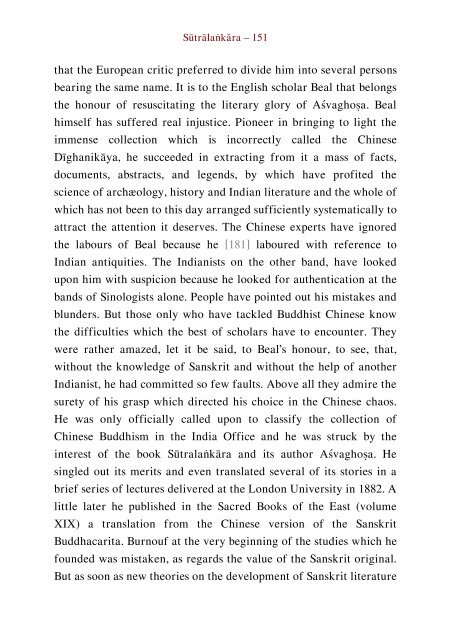Literary History of Sanskrit Buddhism
A study by J. K. Nariman of Sanskrit Buddhism from the Early Buddhist Tradition up to the Mahayana texts proper.
A study by J. K. Nariman of Sanskrit Buddhism from the Early Buddhist Tradition up to the Mahayana texts proper.
You also want an ePaper? Increase the reach of your titles
YUMPU automatically turns print PDFs into web optimized ePapers that Google loves.
Sūtrālaṅkāra – 151<br />
that the European critic preferred to divide him into several persons<br />
bearing the same name. It is to the English scholar Beal that belongs<br />
the honour <strong>of</strong> resuscitating the literary glory <strong>of</strong> Aśvaghoṣa. Beal<br />
himself has suffered real injustice. Pioneer in bringing to light the<br />
immense collection which is incorrectly called the Chinese<br />
Dīghanikāya, he succeeded in extracting from it a mass <strong>of</strong> facts,<br />
documents, abstracts, and legends, by which have pr<strong>of</strong>ited the<br />
science <strong>of</strong> archæology, history and Indian literature and the whole <strong>of</strong><br />
which has not been to this day arranged sufficiently systematically to<br />
attract the attention it deserves. The Chinese experts have ignored<br />
the labours <strong>of</strong> Beal because he [181] laboured with reference to<br />
Indian antiquities. The Indianists on the other band, have looked<br />
upon him with suspicion because he looked for authentication at the<br />
bands <strong>of</strong> Sinologists alone. People have pointed out his mistakes and<br />
blunders. But those only who have tackled Buddhist Chinese know<br />
the difficulties which the best <strong>of</strong> scholars have to encounter. They<br />
were rather amazed, let it be said, to Beal’s honour, to see, that,<br />
without the knowledge <strong>of</strong> <strong>Sanskrit</strong> and without the help <strong>of</strong> another<br />
Indianist, he had committed so few faults. Above all they admire the<br />
surety <strong>of</strong> his grasp which directed his choice in the Chinese chaos.<br />
He was only <strong>of</strong>ficially called upon to classify the collection <strong>of</strong><br />
Chinese <strong>Buddhism</strong> in the India Office and he was struck by the<br />
interest <strong>of</strong> the book Sūtralaṅkāra and its author Aśvaghoṣa. He<br />
singled out its merits and even translated several <strong>of</strong> its stories in a<br />
brief series <strong>of</strong> lectures delivered at the London University in 1882. A<br />
little later he published in the Sacred Books <strong>of</strong> the East (volume<br />
XIX) a translation from the Chinese version <strong>of</strong> the <strong>Sanskrit</strong><br />
Buddhacarita. Burnouf at the very beginning <strong>of</strong> the studies which he<br />
founded was mistaken, as regards the value <strong>of</strong> the <strong>Sanskrit</strong> original.<br />
But as soon as new theories on the development <strong>of</strong> <strong>Sanskrit</strong> literature


















